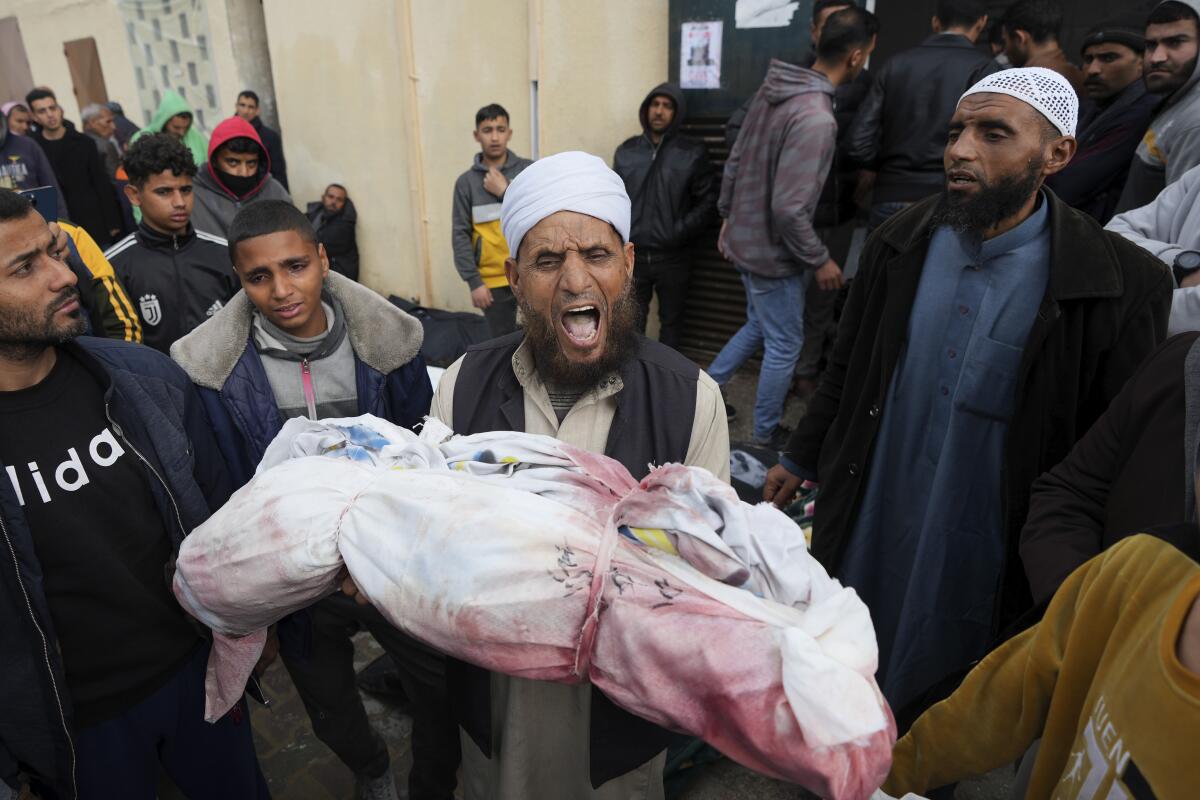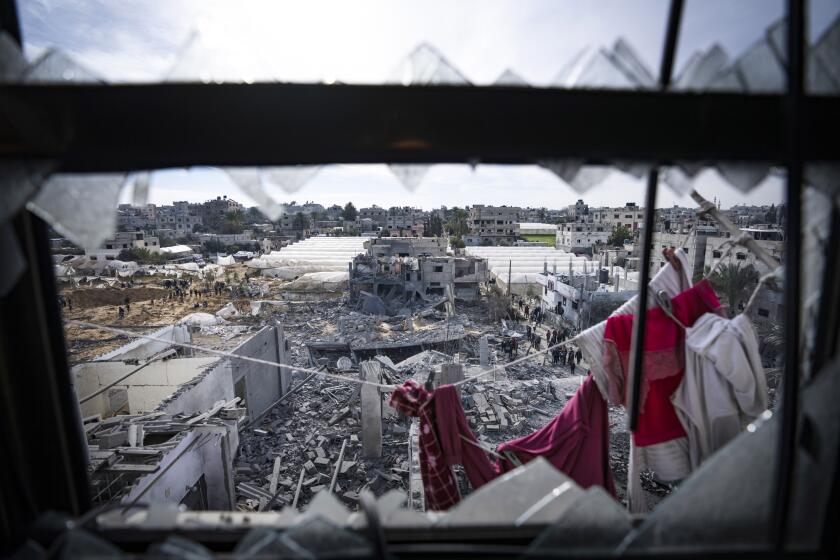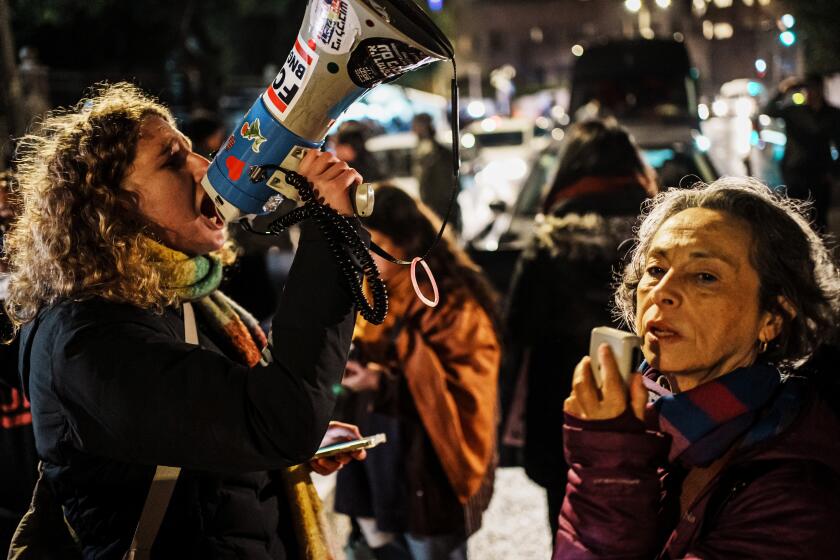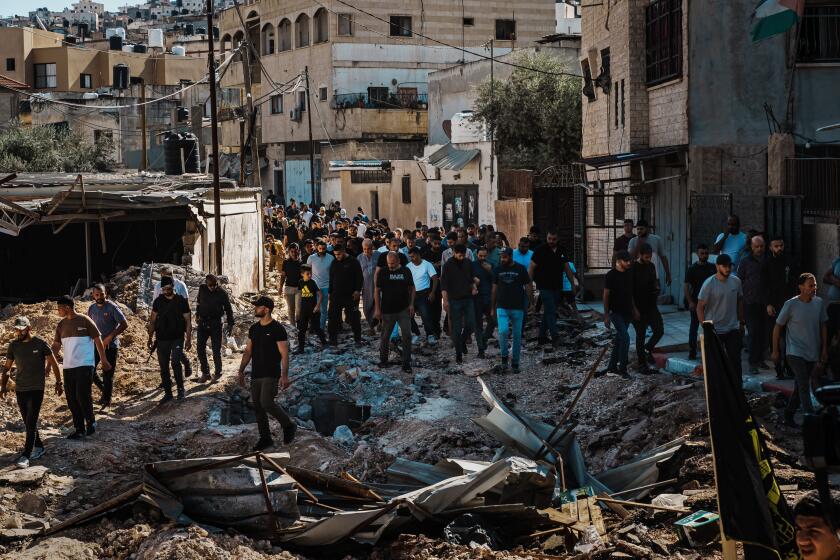More than 29,000 Palestinians have died in Israel-Hamas war, Gaza’s health ministry says

RAFAH, Gaza Strip — Israel’s assault in Gaza has killed more than 29,000 Palestinians since Oct. 7, the territory’s Health Ministry said Monday, marking another grim milestone in one of the deadliest and most destructive military campaigns in recent history.
Israeli Prime Minister Benjamin Netanyahu has vowed to continue the offensive until “total victory” against Hamas after the militants’ October attack on Israeli communities. He and the military have said troops will soon move into the southernmost town of Rafah on the Egyptian border, where more than half of Gaza’s 2.3 million people have sought refuge from fighting elsewhere.
The United States, Israel’s top ally, says it is still working with mediators Egypt and Qatar to try to broker another cease-fire and hostage release agreement. But those efforts appear to have stalled in recent days, and Netanyahu angered Qatar by calling on it to pressure Hamas and suggesting it funds the militant group.
The conflict has also brought near daily exchanges of fire between Israel and Lebanon’s Hezbollah militant group that frequently threaten to escalate.
Gazans crammed into Rafah along the Egyptian border have no place to escape as Israeli attacks hit ever closer in a final bid to rescue remaining hostages.
Israeli warplanes on Monday carried out at least two strikes near the southern port city of Sidon in one of the largest attacks near a major city, wounding 14 people, Lebanese state media said. The Israeli military said it attacked Hezbollah arms depots near Sidon in retaliation for a drone that exploded in an open field near the northern Israeli city of Tiberias earlier Monday.
In Hamas-run Gaza, the Health Ministry said the death toll had risen to 29,092 since the start of the war, with women and children making up about two-thirds of the dead.
More than 69,000 Palestinians have been wounded, overwhelming the territory’s hospitals, less than half of which are even partially functioning. The ministry does not distinguish between civilians and combatants in its counts.
The war began when Hamas-led militants stormed into southern Israel from Gaza on Oct. 7, killing about 1,200 people, mostly civilians, and taking around 250 men, women and children hostage. After a November round of exchanges for Palestinians imprisoned by Israel, militants still hold about 130 hostages, a fourth of them believed to be dead.
More than three months into the Israel-Hamas war, the families of hostages held in Gaza have grown disillusioned with Israel’s military operations.
The Israeli military released a video Monday showing what is believed to be the youngest hostage, his brother and mother being led through the streets of the southern Gaza city of Khan Yunis soon after their kidnapping.
The video appears to show that Shiri Bibas and her two young boys, Ariel, 4, and Kfir, who was 9 months old at the time, survived the initial kidnapping. Rear Adm. Daniel Hagari, the military’s chief spokesman, said the army found the videos in security cameras seized during its attacks in Khan Yunis.
Kfir, the infant with red hair and a toothless smile has become a symbol across Israel for the helplessness and anger over the hostages’ continued captivity. The boys’ father, Yarden Bibas, is also still being held. In a statement, the extended Bibas family pleaded for negotiations to release all of the hostages.
With thousands of Palestinians detained by Israel since the war began, an Israeli human rights group reported that Palestinians inside Israeli prisons face daily violence from guards, who enter cells and beat inmates with batons, kicks and fists without provocation in abuse it said could amount to torture.
Physicians for Human Rights-Israel said in a report Monday that detainees reported guards urinating on them and forcing them to kiss the Israeli flag and to strip. Prisoners are also held in overcrowded cells and deprived of water for long periods, it said.
The U.N. High Commissioner for Human Rights expressed concern about hundreds of Palestinian women and girls in Israeli detention. It said there were credible reports that at least two were raped, and others “subjected to multiple forms of sexual assault,” including being stripped naked and searched by male officers and being photographed “in degrading circumstances.”
The war has driven about 80% of the Palestinians in Gaza from their homes and has left a quarter of the population starving, according to U.N. officials.
The United States says it would veto a U.N. Security Council resolution calling for an immediate cease-fire because it conflicts with its truce and hostage-release efforts.
In an interview with Al-Jazeera, a senior official in Hamas, Khalil al Haya, repeated the group’s demands for releasing the remaining hostages — an end to Israel’s assault, the withdrawal of its troops from Gaza and the release of hundreds of Palestinian prisoners, including top militants. He also said regional stability hinges on the establishment of a fully sovereign Palestinian state — though he did not specify what its borders should be.
Netanyahu has rejected Hamas’ demands.
Palestinians in Jenin refugee camp, a center of West Bank resistance, say repeated Israeli raids appear intended to make their city as uninhabitable as Gaza.
Meanwhile on Monday, the Palestinian Authority’s foreign minister accused Israel of apartheid and urged the United Nations’ top court to declare that Israel’s occupation of lands sought for a Palestinian state is illegal and must end immediately and unconditionally for any hope for a two-state future to survive.
The remarks came at historic hearings at the International Court of Justice in the The Hague into the legality of Israel’s 57-year occupation.
Palestinian Authority Foreign Affairs Minister Riad al Maliki told the court that “2.3 million Palestinians in Gaza, half of them children, are besieged and bombed, killed and maimed, starved and displaced.”
“More than 3.5 million Palestinians in the West Bank, including in Jerusalem, are subjected to colonization of their territory and racist violence that enables it,” he added.
International law expert Paul Reichler, representing the Palestinians, told the court that the policies of Israel’s government “are aligned to an unprecedented extent with the goals of the Israeli settler movement to expand long-term control over the occupied West Bank, including East Jerusalem, and in practice to further integrate those areas within the territory” of Israel.
The hearings follow a request by the U.N. General Assembly for a nonbinding advisory opinion into Israel’s policies in the occupied territories. Judges will likely take months to issue an opinion.
Netanyahu said in a statement Monday that Israel does not recognize the legitimacy of the hearings. Israel rejects any accusation of apartheid. Its representatives were not scheduled to speak but submitted a five-page letter to the court last July that was published after Monday’s hearing.
“While the request made to the Court seeks to portray it as such, the Israeli-Palestinian conflict is not a cartoon narrative of villain and victim in which there are no Israeli rights and no Palestinian obligations,” it said. “Entertaining such a falsehood can only push the parties further apart rather than help create conditions to bring them closer together.”
An unprecedented 51 countries and three international organizations will address the court in the coming days.
Shurafa reported from Rafah and Magdy from Cairo. AP writer Mike Corder in The Hague contributed to this report.
More to Read
Sign up for Essential California
The most important California stories and recommendations in your inbox every morning.
You may occasionally receive promotional content from the Los Angeles Times.












